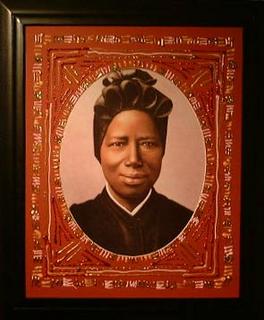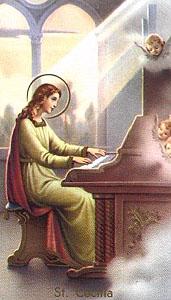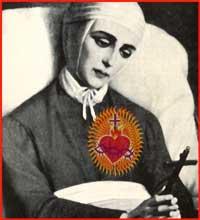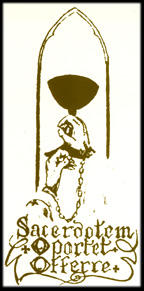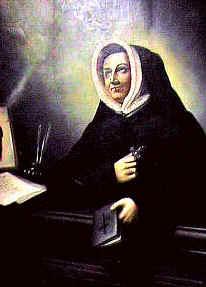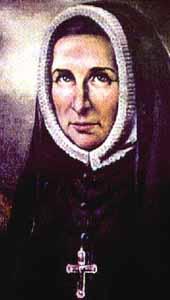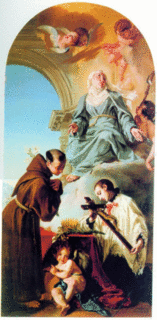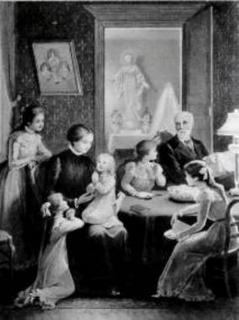
France seems to be the corner stone for revolutionary thinking which at times has reaped a terrible harvest of insurgents who questioned the old order and ushered in an age of discontent with all things religious!
This discontentment was seen in the lead up to the French revolution and then quickly followed by the writers Voltaire, Rousseau and others which began the age of enlightenment.
Into this seething atmosphere of questioning all things Holy two people would be born, both of whom through their most holy union produced a Saint who would become a Doctor of the Church and her saintly sisters, most of whom entered the convent of Carmel.
Louis Martin was born in 1823 at Bordeaux a very picturesque landscape. At Louis Baptismal ceremony, Monsignor Aviau du Bois de Sanzay proclaimed loudly to the assembled crowd, "rejoice, this is a child of destiny!" Surely providential words which would prove to be prophetic.
Zelie Guerin was born in the year 1831, though her Baptism ceremony was more quiet it still held the same reverence as that afforded to her future husband, Louis Martin.
Both Louis and Zelie had hopes of entering Holy Orders, because of their great love of God and their Faith, but it was not to be as God had other plans for this noble couple.
It would be through Louis mother that a friendship occurred between the bookish Louis and the shy and reserved Zelie. This friendship would deepen in a short space of time as both found so much in common with each other. Their deep love of God and the Church, and their compassion for those in need and their shared principles and ideals in life. And much to Madame Martin's joy her son and her new daughter in law were married on 13 July in 1858.
But this also led to some confusion for the couple as they both embraced the ideal of the perfect marriage and took as their example Saint Joseph and The Blessed Mother. But Zelie like many women also longed for her own children to embrace and nurture into loving and holy children of God. After a year of a very chaste marriage both Louis and Zelie Martin spoke to their parish Priest, who advised and encouraged them to embrace the marriage ideal both spiritually and physically.
Their union was to be richly blessed by God but it was also touched with the shadow of loss, as Zelie lost two boys both in infancy, Marie Joseph Louis who died in 1867 and Marie Joseph Jean Baptiste who died in 1868. This grieved the parents deeply as both had longed for boys in order to become missionary Priests of the Church. But also because these children were of their own flesh and blood, and like any parents their hearts were broken over such a loss. But in all things there Faith in God outweighed their deep sorrow, and they clung ever more fiercely to each other and to their beloved Faith.
But their holy marriage though touched with sadness was also fruitful and in 1860 their first child Marie Louise was born and with great joy both parents had their baby Baptised quickly as was the custom of the day in case of infant mortality. Marie Louise would be joined by her sisters, Marie Pauline born in 1861, followed by Marie Leonie in 1863, then Marie Helene in 1864, and Marie Celine in 1869 soon to follow was Marie Therese Melanie born in 1870 then came Marie Francoise Therese born in the year 1873.
But with all the joys of welcoming in their new born and beloved children once again tragedy would strike at the family in the loss of their beloved daughters Marie Helene and Marie Therese Melanie, who joined their baby brothers in Heaven. And amidst the grieving for the loss of their beloved children France was in turmoil when the Prussians under Bismarck was at war within their beloved land. Both Louis and Zelie were of military background so it troubled them deeply to see their beloved France under occupation and suffered the humiliation felt by all the French people over such an outrage!
So though the family suffered with both loss of their beloved children and also fretted over the future of their beloved country they continued to instruct their little family of daughters in prayer, matters of Faith and love of God. Zelie also practiced the works of mercy in her neighbourhood and for those who came to her home to seek help. This was a marvellous example for all the girls to witness, as they too helped their mother to care for those less well of than themselves and fostered within each child compassion for the poor.
Both parents also had a deep love for the Eucharist, and taught their children the fundamentals of the Catholic Faith, by a deep and committed prayer life. The children of Louis and Zelie would often pray the Rosary together as a family and they also joined in on any Eucharistic celebration within their Parish. The love that both parents had for their Faith was passed on to each of their children, even in the midst of personal pain and loss and the misfortunes of their country the Martin girls were taught to rely and trust in God and His unfailing love for them. Both Louis and Zelie were perfect examples of living a holy marital union, whilst combining their work and activities into a prayer, which provided their daughters a good example to follow.
Zelie Martin even through her immense grief and heartache at the loss of her infant sons and beloved daughters was able to show her remaining daughters a valiant spirit which was dedicated to God and also longsuffering in allowing God's Will to prevail in her life. Zelie Martin was also a proficient and gifted lace maker a most prized art form in that era, and though not given to vanities she would have dressed her girls well for daily Mass and other Church activities.
But a shadow was to fall over the family when Zelie started to feel discomfort in her upper chest and felt a lump in her breast. It was not long before a tumour was discovered and Zelie with much motherly concern and love knew her time on earth to look after her beloved husband and daughters would come to an end. She accepted the news with serenity and meekness accepting God's Will but still her motherly heart prevailed and though she fought valiantly against the encroaching cancer, but it was not to be and knowing her end was near she asked her sister in law and friend Madame Guerin to look after her little family once she had gone. Zelie Martin died on August 28 1877; she would not live to see her daughters enter the Convent.
Louis Martin who had depended so much on his wife’s strength suffered a terrible grief which would stay with him the rest of his life for he had loved his beloved Zelie with all his heart. But as always, his great Faith and belief in a Loving God helped Louis accept the death of his beloved Zelie with no bitterness, just meekness of heart and an acceptance of God's Will. But with the memory of Zelie so strong in their home, it was thought best to move the family to Lisieux, in order to be closer to their other relatives.
Through all of this the children tried their utmost to cope with the loss of their beloved mother, even though it would be both troubling to the little Therese and in another sense to their sister Leonie, who struggled with most things, and at times could be rebellious. In the case of Leonie it was found to be a maid who with great cunning was able to have a terrible hold over the impressionable Leonie. And though Zelie Martin dismissed the maid, the repercussions of her influence continued to trouble Leonie, who at times continued to bicker with her other sisters. But Leonie struggled valiantly to overcome her tumultuous personality and to follow the example set by her parents.
The death of her mother also affected the little Therese and made her especially oversensitive and wont to cry or to cling to her beloved father and sisters. Most especially to her older sister Pauline who became a mother figure to Therese, whilst Celine would be her favourite sister and play mate. But the death of her beloved mother would plague little Therese with immense insecurities, and upon being sent away to school the little Therese wept inconsolably at being removed from her beloved family. But she tried her hardest to struggle on, for once again the shining example of their mother held all the girls in good stead.
But Therese upon being told of her sister Pauline's decision to enter the Order of Carmel was to bring on a terrible form of grief and hysteria, which simply brought forth her deep insecurity at losing her mother at such an impressionable age. Therese soon fell ill with a mysterious ailment, which brought on fevers and copious weeping even unto hallucinations. Her Father and sisters were terribly worried for their little sister and none of the doctors could fathom what was the cause of Therese ailments.
So once again the family led by their Father turned to prayer and prayer vigils for the healing of their little Therese. And it was during this prayer vigil that a miracle would bring Therese out of this serious emotional affliction, as she witnessed with astonishment that the statue of the Virgin Mary which the family placed in her room, smiled at her. Therese upon seeing this was immediately cured, but the little one still had to face many internal struggles. This was mainly due to her very sensitive nature and her total dependence on her family and their opinions on her behaviour. As Therese struggled with this predicament, she also felt an inner calling to the Order of Carmel. But as the time grew closer to her first Communion, Therese spiritually became stronger as she so longed to receive Jesus in the Eucharist.
Pauline Martin joined the convent of Carmel in Lisieux in 1882, taking the Religious name Sister Agnes. Her sister Marie would also join the same Order in 1886, taking the name Sister Marie. And while both Pauline and Marie were steadfast in their decision Leonie struggled to find God's Will in her own life, attempting at various times to join the Order of the poor Clares and making several attempts to join the Visitation Sisters. But though Leonie struggled with many things and issues her love for God was never in doubt.
While Leonie and Therese struggled with their own insecurities, their sister Celine appeared more mature and was a great consolation to their father, Louis. For Louis though a loving father was also a little perplexed with the insecurities exhibited by both Leonie and Therese. But though a loving father he still was the head of the home and so decided that the Christmas custom of placing gifts in the children’s shoes needed to come to an end, as all his children were now more mature in age. Celine expected a show of tears from Therese at this pronouncement but instead Therese surprised Celine by seeming to accept this with little fuss. Therese was growing up and moving beyond her childhood insecurities into a more loving and trusting love of Jesus.
It was not long after this that Louis, Celine and Therese embarked on a longed for journey to Rome. But Therese was already deciding to appeal to the Pope in order for her to be received in the Order of Carmel at a very young age. The Martin family toured all of Italy including Assisi, Florence, Venice before their meeting with Pope Leo Xlll. But things did not go according to plan and one of the officials asked the family not to approach His Holiness, but this did not deter the strong willed Therese who flung herself upon the Popes Mercy and begged to be allowed to enter Carmel. Both her Father and Celine were a little embarrassed at Therese's lack of composure but with tender love they knew how much Therese longed to become a Religious.
For Celine she was also feeling the stirrings of a longing to join this most beautiful Order of Carmel, but due to Leonies problems and the difficulties with Therese she had kept her own feelings much to herself. Celine over time was to prove a comforting companion to her father and also a wise companion for both her sisters still at home.
Leonie even though at times she struggled and was perhaps a little wilful was not disobedient, especially when it came to her love of God. It does show an inner strength and also a humble heart that many times Leonie did not feel as intelligent nor as gifted as her other sisters, yet neither jealousy nor envy, entered her heart. For Leonie loved and admired all her sisters but lacked their ease with others and their conviction in which direction she should take.
But unlike Leonie, Therese had no doubt as to where her heart lay and upon permission she entered the Order of Carmel in 1888, she would make her Profession in 1890.
But once again between the sunshine of their days as a family shadows also must pass by and it was in 1888 that Louis Martin became seriously ill, this caused severe heartache to all his daughters as their father had suffered a severe stroke which would effect his mental capabilities, and his ability to reason.
During this time Celine became a rock to their frail Father as well as to her other sisters, and even though Celine at times felt overwhelmed by such a responsibility, still she persevered. But mercifully as their father continued to struggle with mental confusion God called this great son home to be reunited with his beloved Zelie and his children in the year 1894.
And though Celine and her other sisters grieved deeply over this loss, the death of her beloved father also freed Celine to follow her own heart and embrace the calling of Carmel to be a Religious alongside her other sisters. And on September 14 1894 Celine entered the Order of Carmel taking the Religious name Sister Genevieve.
But Leonie was not to be left alone and after much trials and many tribulations and sufferings, she too embraced the Visitation Order and followed in her Aunts footsteps. Though Leonie did not have a easy path for her own nature made things difficult and at times her frail constitution, still she persevered and in 1900 Leonie's dream of becoming a Religious in the Visitation Order finally came to fruition as she took the name Sister Frances.
So through this most holy and blessed union between this courageous and holy couple Louis Martin and Zelie Guerin, they upon their marriage produced the flowers of Carmel, and a daisy in the field of the Visitation Sisters.
Both Louis and Zelie Martin are perfect examples to all of the holiness of marriage and that through loving and prayerful perseverance, love overcomes all adversity. Truly they are a most holy and inspiring couple.
Louis and Zelie were proclaimed Venerable, by Pope John Paul ll in 1994.
Peace of Christ to ALL
Copyright © 2005 Marie Smith. All rights reserved.
